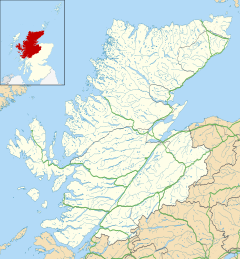Torridon Hills
| Torridon Hills | |
|---|---|

The Torridon hills, viewed from the Shieldaig peninsula.
|
|
|
|
|
| OS grid reference | NG895565 |
| Coordinates | 57°32′56″N 5°31′12″W / 57.549°N 5.520°WCoordinates: 57°32′56″N 5°31′12″W / 57.549°N 5.520°W |
The Torridon Hills surround Torridon village in the Northwest Highlands of Scotland. The name is usually applied to the mountains to the north of Glen Torridon. They are among the most dramatic and spectacular peaks in the British Isles and made of some of the oldest rocks in the world. Many are over 3000 feet high, so are considered Munros.
These are mainly made of a type of sandstone, known as Torridonian sandstone (see Geology of Great Britain), which over time has become eroded to produce the unique characteristics of the Torridon Hills. In geology, Torridonian describes a series of proterozoic arenaceous sedimentary rocks of Precambrian age. They are amongst the oldest rocks in Britain, and sit on yet older rocks, Lewisian gneiss. Some of the highest peaks, such as Beinn Eighe are crowned by white Cambrian quartzite, which gives those peaks a distinctive appearance. Some of the quartzite contains fossilized worm burrows and known as pipe rock. It is circa 500 million years old. The strata are largely horizontal, and have weathered into terraces on the mountains.
Each of the Torridon Hills sits very much apart from one another, and they are often likened to castles. They have steep sides, and broken summit crests, riven into many pinnacles. There are numerous steep gullies running down the terraced sides from the peaks. The summit ridges provide excellent scrambling, and are popular with hillwalkers and mountaineers. However, like many ridge routes, there are few escape points, so once committed, the scrambler or hillwalker must complete the entire ridge before descent.
...
Wikipedia

